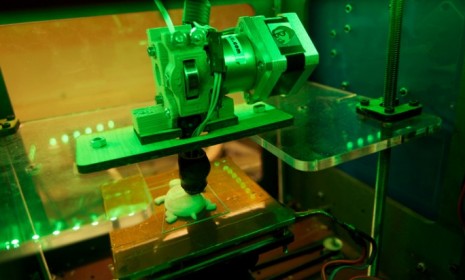What is a 3D printer, anyway?
Notorious peer-to-peer site The Pirate Bay says the next age of file-sharing will be 3D printing. But how, exactly, does that work?

A free daily email with the biggest news stories of the day – and the best features from TheWeek.com
You are now subscribed
Your newsletter sign-up was successful
Controversial file-sharing site The Pirate Bay usually plays host to music and movies. But now the site's creators are working on a new download section that will allow users to freely distribute files a 3D printer can translate into real-life objects, from mugs to toothbrushes to toys. But how, exactly, does a 3D printer work? And is it really the next battleground for online copyright?
What does a 3D printer do?
It's a form of manufacturing that takes three-dimensional image files and "prints" them into physical objects using a variety of materials, typically plastic. The printers themselves are usually "a little larger than a hat box," says Reggie Ugwu at Complex, though they do come in larger sizes. Image files can be created from programs such as Google SketchUp, AutoCad, and Adobe Illustrator to be sent to a 3D printer through a USB connection — just like you would a normal document.
The Week
Escape your echo chamber. Get the facts behind the news, plus analysis from multiple perspectives.

Sign up for The Week's Free Newsletters
From our morning news briefing to a weekly Good News Newsletter, get the best of The Week delivered directly to your inbox.
From our morning news briefing to a weekly Good News Newsletter, get the best of The Week delivered directly to your inbox.
How does it "print" an object?
Essentially, it prints out the object "layer by layer," says Ugwu, "similar to the way a printer creates text and images line by line." It's an "additive process," says Tony Hoffman at PC Mag. Unlike sawing or sanding, which are subtractive processes, the 3D-printer builds an object "from scratch." If you're printing a plastic figurine, for example, the "ink" would be melted plastic poured through an extruder and built up one thin cross-section at a time. It's time-consuming: The printing process can take anywhere from a few minutes to a few hours.
How much does a 3D printer typically cost?
They don't come cheap. The smallest commercial units available today cost upwards of $1,000, with the highest quality models fetching much more.
A free daily email with the biggest news stories of the day – and the best features from TheWeek.com
Who uses them?
Anyone, really. Architects often use them to produce scaled-down models of building units, and artists are known to use them to produce works of art. One enterprising orthopedic surgeon used a 3D printer recently to make replicas of a patient's bones in preparation for surgery — saving his hospital thousands of dollars.
And you'll be able to download 3D image files from Pirate Bay?
Soon enough. "We believe that the next step in copying will be made from digital form into physical form. It will be physical objects. Or as we decided to call them: Physibles," the site's proprietors wrote in a blog post. Anyone can upload, share, and download designs for toys (or one day even shoes) directly from the Pirate Bay website.
Is this really the next frontier for copyright?
It might not be. With its entrance into the world of 3D printables, the website "might not actually break copyright laws," says Nick Bilton the The New York Times. According to old copyright rules, recreating an object considered "useful" is not a violation of the law, whereas recreating an object that's "purely aesthetic" — like a piece of art — is. Thus, a "useful object may be patentable," but copyright is a different area of the law altogether.
Sources: Complex, Extreme Tech, NY Times, PC Mag, Singularity Hub
-
 Local elections 2026: where are they and who is expected to win?
Local elections 2026: where are they and who is expected to win?The Explainer Labour is braced for heavy losses and U-turn on postponing some council elections hasn’t helped the party’s prospects
-
 6 of the world’s most accessible destinations
6 of the world’s most accessible destinationsThe Week Recommends Experience all of Berlin, Singapore and Sydney
-
 How the FCC’s ‘equal time’ rule works
How the FCC’s ‘equal time’ rule worksIn the Spotlight The law is at the heart of the Colbert-CBS conflict